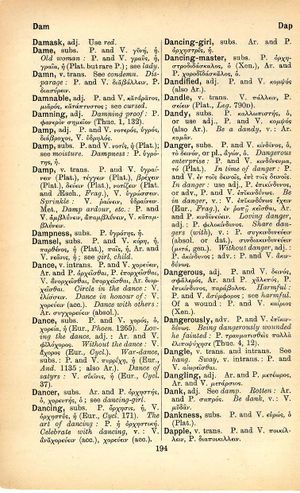danger: Difference between revisions
From LSJ
ὁ φίλος ἐστὶν ἄλλος αὐτός → the friend is another self
(CSV3) |
m (Text replacement - "<b class="b2">Frag.</b>" to "''Frag.''") |
||
| Line 10: | Line 10: | ||
<b class="b2">In danger</b>: use adj., P. [[ἐπικίνδυνος]], or adv., P. and V. ἐπικινδύνως. | <b class="b2">In danger</b>: use adj., P. [[ἐπικίνδυνος]], or adv., P. and V. ἐπικινδύνως. | ||
<b class="b2">Be in danger</b>, v.: V. ἐπικινδύνως ἔχειν (Eur., | <b class="b2">Be in danger</b>, v.: V. ἐπικινδύνως ἔχειν (Eur., ''Frag.''), ἐν ῥοπῇ κεῖσθαι, Ar. and P. κινδυνεύειν. | ||
<b class="b2">Loving danger</b>, adj.: P. [[φιλοκίνδυνος]]. | <b class="b2">Loving danger</b>, adj.: P. [[φιλοκίνδυνος]]. | ||
Revision as of 11:02, 7 August 2017
English > Greek (Woodhouse)
subs.
P. and V. κίνδυνος, ὁ, τὸ δεινόν, or pl., ἀγών, ὁ.
Dangerous enterprise: P. and V. κινδύνευμα, τό (Plat.).
In time of danger: P. and V. ἐν τοῖς δεινοῖς, ἐπὶ τοῖς δεινοῖς.
In danger: use adj., P. ἐπικίνδυνος, or adv., P. and V. ἐπικινδύνως.
Be in danger, v.: V. ἐπικινδύνως ἔχειν (Eur., Frag.), ἐν ῥοπῇ κεῖσθαι, Ar. and P. κινδυνεύειν.
Loving danger, adj.: P. φιλοκίνδυνος.
Share dangers (with), v.: P. συγκινδυνεύειν (absol. or dat.), συνδιακινδυνεύειν (μετά, gen.).
Without danger, adj.: P. ἀκίνδυνος; adv.; P. and V. ἀκινδύνως.

